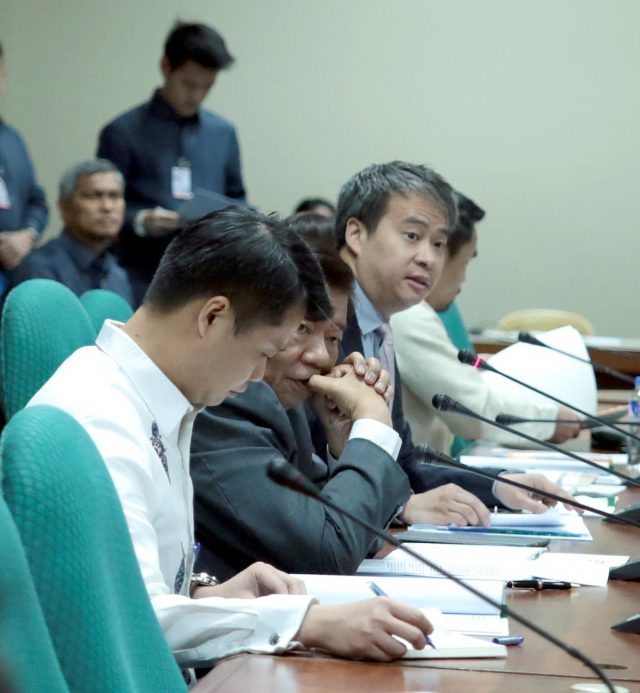
MANILA – Senator Joel Villanueva on Wednesday scrutinized the government’s labor protection policies for overseas Filipino workers (OFWs) in light of the gruesome death of 29-year-old Joanna Daniella Demafelis, as well as other OFWs in Kuwait.
“Are OFWs informed of their rights in the foreign country as part of the pre-orientation departure seminar? Are they informed of the options they could take whenever they run into grave situations?” Villanueva said.
Villanueva, chair of the Senate committee on labor, employment, and human resources development, lamented that under Kuwait’s kafala system, workers cannot legally leave the country without the consent of their employers. Running away from employers without their consent is a criminal offense in the Arab nation.
“I would like to mention that our migrant workers based in Kuwait are experiencing very different and difficult working conditions. Like other Gulf countries, Kuwait has adopted the notorious kafala system or sponsorship system,” Villanueva said.
“This system hinders the rights of our migrant workers. Accounts made by the UNCHR and the ILO highlight how our OFWs would have to ask their employers’ consent before they can leave the country; and if they do not comply, they may face criminal charges,” the senator said.
“The kafala system has facilitated the abusive practice of altering the terms of employment contract of migrant workers or taking their passports and identifications as leverage,” Villanueva added.
Foreign Affairs Undersecretary Ernesto Abella and Presidential Adviser on OFW and Muslim Concerns Sec. Abdullah Mama-o confirmed Villanueva’s statements regarding the poor working conditions of migrant workers under Kuwait’s kafala system, likening the activity to “slavery”. This makes Kuwait only “partially compliant” with the guarantees provided under RA10022 or the amended Migrant Workers and Overseas Filipino Workers Act.
In the case of the latest fatality Demafiles, her body was found in a freezer in her employers’ apartment in Kuwait, a year after her family first reported her missing – they could no lonbger reach her – and asked Philippine authorities for help.
Based on the Philippine Overseas Labor Office (POLO) records, five to seven Filipino household workers run to POLO shelters daily to seek refuge from abusive employers.
Villanueva said that red flags should have prompted the government earlier on the necessity of implementing a deployment ban of OFWs to Kuwait.
“Why did the DOLE not impose the ban sooner considering the increasing number of deaths reported from 82 in 2016 to 103 in 2017, not to mention the 1,447 cases of maltreatment, 2,959 cases of contract violation, 227 sexual abuses and 63 cases of rape of Filipino workers for just a period of one year from 2016?” Villanueva said.
Villanueva further pointed out that Kuwait has not ratified and is not a signatory of any conventions pertaining to the protection of migrant workers, primarily the ILO Convention 189 on domestic workers’ protection, the 2003 International Convention on the Protection of the Rights of All Migrant Workers and Members of their Families, and the 1975 Convention concerning Migrations in Abusive Conditions and the Promotions of Equality of Opportunity and Treatment of Migrant Workers.
Villanueva also shared that the Domestic Worker Law of Kuwait is silent on the procedures and penalties that may be imposed in the event that an OFW encounters physical and sexual abuse from his or her employer, as well as conditions that entitles an OFW for immediate repatriation.
“Section 4 of RA10022 requires that before the Philippines send migrant workers to a host country, the government should verify that it has existing labor and social laws protecting the rights of all workers, including migrant workers,” Villanueva stressed.
“Nabigo po tayong lahat dito sa nangyari kay Joanna. Binigo po natin siya dahil walang sumaklolo. Kulang ‘yung sistema, kulang yung programa para hindi na sana umabot sa ganito [We all failed in Joanna’s case. We failed her because no one came to her aid. The system was flawed, programs inadequate; this shouldn’t have come to this],” the senator said.
In January 2017, Villanueva had already urged the government to suspend the deployment of household service workers to Kuwait after the death of domestic helper Amy Capulong Santiago, who was beaten to death by her Kuwaiti employers. Santiago reportedly died the same day OFW Jakatia Pawa was executed by hanging on January 25, 2017.
“Nais natin iparating sa ating mga ‘bagong bayani’ na hindi tayo nagkikibit-balikat lamang sa usaping ito dahil buhay po— buhay ang pinaguusapan natin dito,” Villanueva said.
“Ang bottomline lamang ho ng pagdinig na ito ay masiguro natin na wala nang panibagong Joanna Demafelis na magsasakripisyo ng kanyang buhay dahil sa mga polisiya ng gobyerno sa overseas deployment of workers at kawalan ng sapat na proteksiyon [The bottomline: with this hearing we hope to ensure there will be no more like Joanna sacrificing their lives because of wrong policy and lack of protection],” the senator concluded.
READ ALSO: DOLE sending team to Mideast as PH prods Kuwait on labor accord to prevent OFW abuse









